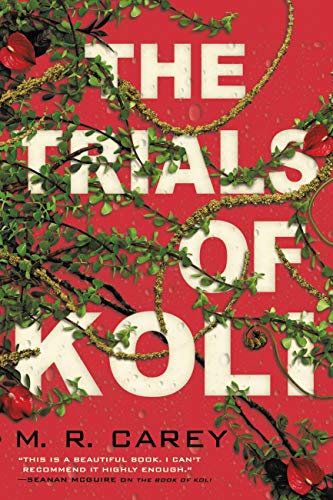
![]() The Trials of Koli by M.R. Carey
The Trials of Koli by M.R. Carey
M.R. Carey’s The Book of Koli was one of my favorite reads this year. I loved everything about it and was eagerly awaiting the sequel, The Trials of Koli (2020), which was, thankfully, released only a few months after The Book of Koli appeared. There will be some spoilers for The Book of Koli in this review, so beware.
Koli is still on the run. He misses his mother and sisters but can’t go back home or he’ll be hanged. He continues to travel with Ursula, the strange woman who knows a lot about science, medicine, and technology and who is accompanied by a piece of “tech” that is able to diagnose illnesses, shoot down enemies, and other such handy things. A girl named Cup is also with them, but not voluntarily. They saved her from a cult and she is still hostile. Lastly there’s Monono, the seemingly conscious entity that inhabits the Sony entertainment device that Koli stole in the last book (which led to his exile). Ursula trusts neither Cup nor Monono and actively seeks to reduce their influence over Koli, but Koli feels protective toward them, seeing them both as girls who’ve been enslaved in some way.
Koli and his companions are on their way to London where they hope to find more tech and, as Ursula calls it, a “gene pool.” (Koli has no idea what that is but knows it’s needed to create more people and save the dwindling human race.) As they travel toward London, Monono teaches Koli about what his world used to be like and how it was destroyed. The little group will encounter all sorts of set-backs including antagonistic people who want to stop them, benevolent people who want to delay them, monsters, and unexpected changes in the landscape. Fortunately they have some weapons including Cup’s skill with a bow, Ursula’s diagnostic device, and Monono’s ability to blast loud grinding death metal (specifically, this horrifying “song”).
A new feature in this second book is the perspective of Spinner, the girl from Koli’s village who he had a crush on. She dumped Koli, married one of the Ramparts who can use tech (and therefore rule the village) and, as she learns the secrets of the Ramparts, is becoming disillusioned with her new family and, therefore, her entire society. Clearly, she will have a role to play in setting things right.
The Trials of Koli is not as exciting as the first book was. This is mostly because we’re already familiar with the world, so the sense of wonder we felt in The Book of Koli is lacking. Even the surprises aren’t very surprising. The story moves slowly – there’s a lot of travelling. The Trials of Koli definitely feels like a middle book.
But that doesn’t mean I didn’t like it. Koli is an appealing hero who, though ignorant and naïve, is thoughtful and kind-hearted. The post-apocalyptic world is still fascinating and I can’t wait to see if Koli and his friends can redeem it. Though I didn’t feel the same way about The Trials of Koli as I did about The Book of Koli, I am still eager to read the final book, The Fall of Koli, which is due out next March. I’m listening to the audiobook versions which are published by Hachette Audio and are read by the highly skilled Theo Solomon and a new narrator, Saffron Coomber, for Spinner’s perspective. If you find Koli’s bad grammar to be a stumbling block, the audio version will solve that problem for you.



This sounds like a great series. And yes, that music would incapacitate me.